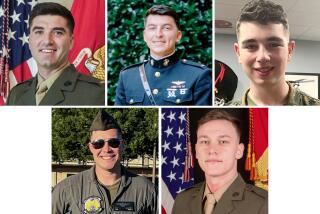It’s Taps for Tustin Unit : Tears Appear in Marine Vets’ Eyes as Helicopter Squadron 301 Deactivated
- Share via
TUSTIN — The squadron was born of the Vietnam War.
Later it trained young fliers for missions in Grenada, the Persian Gulf and Somalia.
And finally, on Thursday, Marine Medium Helicopter Training Squadron 301 was officially deactivated in an emotional ceremony that brought tears to the eyes of some usually stoic military personnel.
“It was sad,” said Doug Wetmore, 39, a recent Marine retiree who had served with the group for more than a year. “This was a good squadron, one of the best I’ve ever been in. Knowing that its colors will never fly again kind of leaves an empty spot inside.”
The ceremony took place on a Tarmac at the Marine Corps Air Station in Tustin, marking the end of a 27-year existence during which the training squadron turned out more than 2,500 helicopter pilots and crew members. It also marked the first visible sign of the military downsizing in preparation for the scheduled 1997 closing of the Tustin base.
“This is the beginning of the end,” said Artie Griffiths, 36, an aviation electronics specialist assigned on and off to the squadron since 1986. “It’s the beginning of everything starting to go. This is a hard pill to swallow.”
After being formed in April, 1966, to train pilots and crews for the Vietnam War, according to commanding officer Lt. Col. John K. Feuerriegel, the helicopter training unit--known as HMT-01--supplied personnel for virtually every major military action since then in which the United States has been involved.
“I’m extremely proud of these Marines,” Feuerriegel said Thursday. “They did their job well.”
Recently, however, military planners faced with shrinking budgets and mandates from Washington have begun searching for ways to eliminate overhead. As part of that effort, Feuerriegel said, the 10-craft helicopter training unit will be combined with a similar squadron in Florida.
“It’s just more economical to operate one big unit than two smaller ones,” Feuerriegel said. “A base can only accommodate so many units, and this is one less we will have to accommodate” upon closing in 1997.
Such logical rationales seemed far away Thursday, however, as an estimated 150 people--including many former squad members--gathered for an emotional farewell to the unit in which the majority had spent their formative years.
Like most military events, this one featured pomp and pageantry. Dressed in camouflage fatigues, the 3rd Marine Aircraft Wing Band marched smartly across the field past a grandstand. An honor guard stood at attention doing precision routines with rifles that smacked at the slap of their hands. And behind it all, a bevy of flapping flags provided a patriotic backdrop as visitors browsed through an exhibit of squadron memorabilia including scrapbooks, photographs, trophies and coffee mugs.
The most emotional moment, however, came near the end when Feuerriegel, standing stiffly on the Tarmac, rolled up his squadron’s flag and solemnly slid it into a cover. Then, as a group of Marines bearing the now-covered flag marched slowly off the field, the band played Auld Lang Syne.
“Being here brought back a lot of memories,” said Larry Garcia, 44, who served in the squadron from 1971 to 1973. “It’s sad to see it all end.”
Seated in the audience was one man for whom the deactivation ceremony completed a circle of sorts. He was Lt. Col. William R. Duncan, 72, the helicopter unit’s first commander, now a retired title insurance salesman living in Dana Point.
“I uncased the colors in 1966,” Duncan said, “and today I saw them cased. It was sort of like a funeral.”


